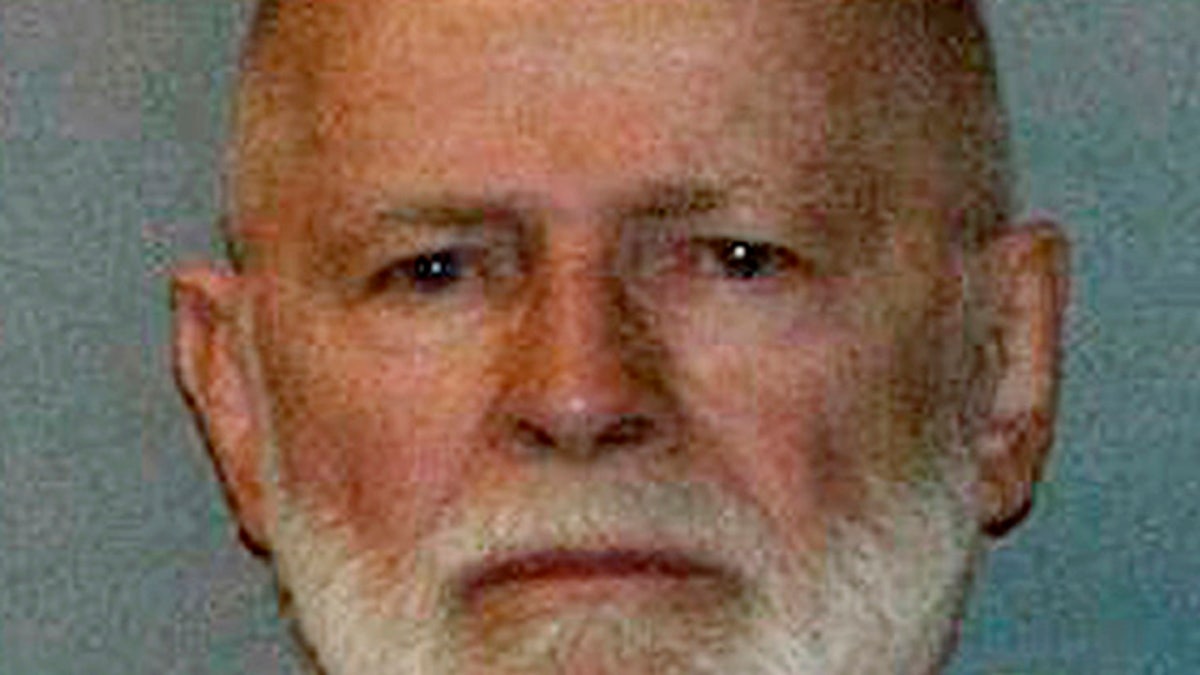
James "Whitey" Bulger's booking photo. (AP Photo/WBUR 90.9, File)
BOSTON – The attorney for James "Whitey" Bulger said Monday that the former Boston mob boss and one-time FBI informant shouldn't be prosecuted in 19 murders because the government promised him immunity for past or future crimes.
Attorney J.W. Carney said he'd soon file a motion to dismiss the charges because "a representative of the federal government" gave Bulger the blanket immunity during the 1970s.
Carney wouldn't say who allegedly gave Bulger immunity or explain how it was possible to grant immunity for future crimes, saying it would all be in his motion.
The sensational allegation came on a busy day for Bulger's defense, which was granted a four-month delay in Bulger's trial Monday. And earlier in the day, Carney filed a motion to have the trial judge in the case recused, saying he expected to call him as a witness during his motion to dismiss.
Carney said U.S. District Judge Richard Stearns was a top prosecutor in the U.S. Attorney's office when Bulger was allegedly committing crimes with impunity during the 1980s. But Carney noted the office never charged Bulger, and he argued Stearns would now do whatever he could to shield former colleagues who knew of the alleged immunity deal.
"Since Judge Stearns was part of the governmental prosecuting agency which did nothing to stop the defendant from committing the criminal acts when they occurred, no reasonable person would believe he can now be impartial," Carney wrote in a motion for recusal.
Christina DiIorio-Sterling, spokeswoman for the U.S. Attorney's office, said the office didn't have any comment on Carney's motion or allegations. "The government will respond as appropriate through the court," she said.
Steve Davis, whose sister Debra was allegedly strangled by Bulger in 1981, was stunned by Carney's allegations of an immunity deal.
"A license to kill, according to Mr. Carney. It gets you boiling. ... I don't even know how to put the thoughts together," he said. "There had to be some agreement for all the crime he was committing, but I don't think he had (a) license to kill or murder."
Bulger, who allegedly ran the notorious Winter Hill gang, was a top-echelon FBI informant who fled Boston in 1995 after being tipped by John Connolly Jr., his longtime FBI handler, who recently completed a 10-year prison sentence on racketeering charges. Bulger was captured in Santa Monica, Calif., in June after 16 years on the run
Carney had argued the case is so complex, he needed until November 2013 to prepare his defense, including reviewing 320,000 pages of evidence turned over by prosecutors. The evidence was such a mess when it was given to him it was like a "shuffled deck of cards," Carney argued.
But prosecutors say Carney hasn't accepted their help and preferred to "wallow in confusion and to complain." They also said Carney's problems were his client's own fault, because he remained a fugitive for so long.
On Monday, U.S. Magistrate Judge Marianne Bowler granted Carney's motion to delay the start of Bulger's trial from this November until March 4, 2013, calling it a compromise.
"Clearly, the (evidence) remains a problem in this case, because of its volume," she told Carney. "Clearly, you have a right to review it."
Prosecutors said they'd call 30 to 50 witnesses at Bulger's trial, which they estimated could last up to three months.
Tom Donahue, whose father was allegedly killed by Bulger when Bulger was targeting another man, said his biggest concern about the delay granted Monday is that Bulger won't live long enough to face justice.
"He's an old man. I'm worried about him surviving. Time is not on our side," he said. "But it's only four months."

